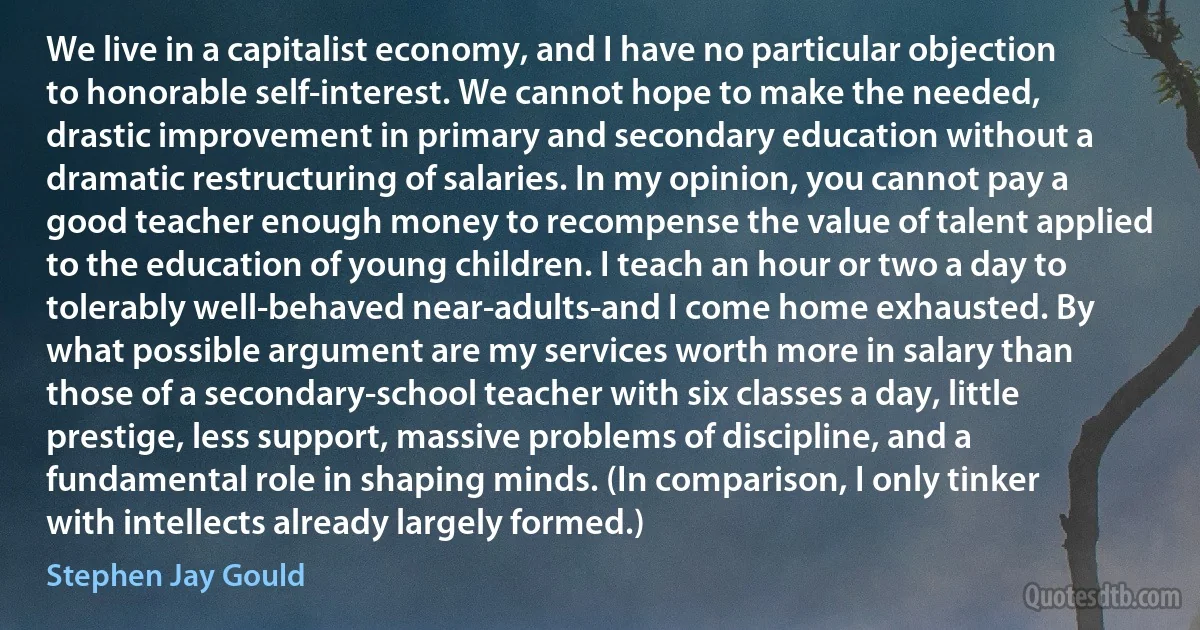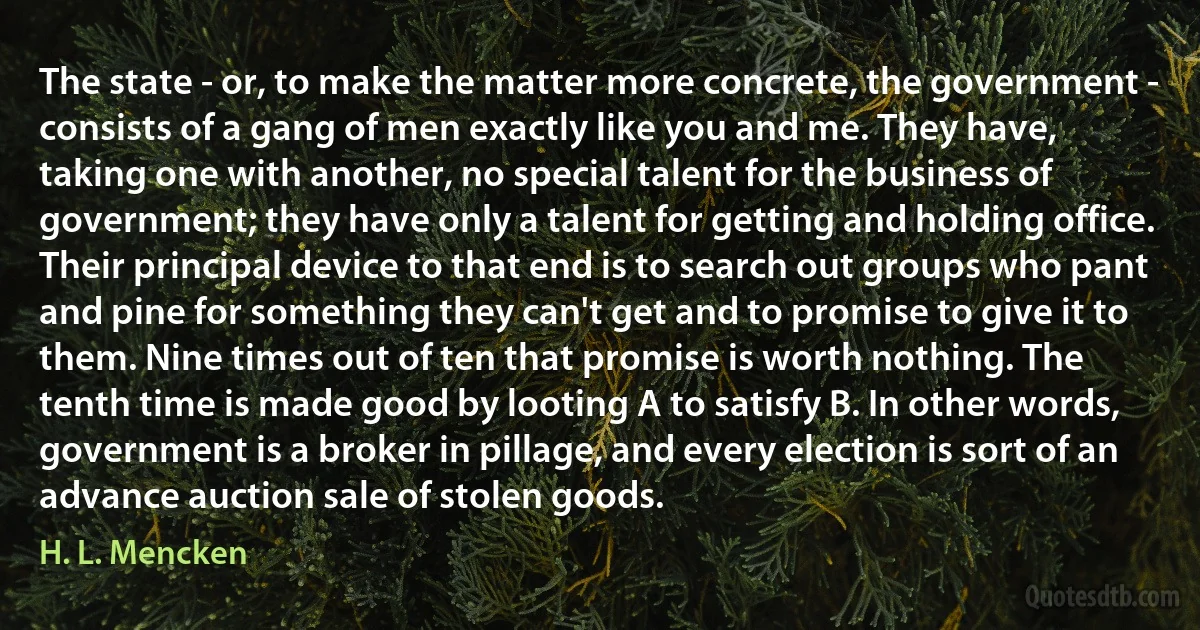Talent Quotes - page 65
If, from the idea of motherland, you take away covetousness, hatred, envy and vainglory; if you take away from it the desire for predominance by violence, what is there left of it?
It is not an individual unity of laws; for just laws have no colors. It is not a solidarity of interests, for there are no material national interests - or they are not honest. It is not a unity of race; for the map of the countries is not the map of the races. What is there left?
There is left a restricted communion, deep and delightful; the affectionate and affecting attraction in the charm of a language - there is hardly more in the universe besides its languages which are foreigners - there is left a personal and delicate preference for certain forms of landscape, of monuments, of talent. And even this radiance has its limits. The cult of the masterpieces of art and thought is the only impulse of the soul which, by general consent, has always soared above patriotic littlenesses.

Henri Barbusse
We were talking earlier about lyrics and beautiful lyrics. That particular period that we've been dwelling upon this evening, partly, and in fact definitely, was a time for prolific writing. Recently, not too long ago, we lost one of the better, most beautiful, caucasian singers, Jeff Buckley, sadly, way, way out to lose such a talent and such a heart.

Jeff Buckley
His talent was as natural as the pattern that was made by the dust on a butterfly's wings. At one time he understood it no more than the butterfly did and he did not know when it was brushed or marred. Later he became conscious of his damaged wings and of their construction and he learned to think and could not fly any more because the love of flight was gone and he could only remember when it had been effortless.

Ernest Hemingway
It is plain that God does not employ drugs or hygiene, nor provide them for human use; else Jesus would have recommended and employed them in his healing. The sick are more deplorably lost than the sinning, if the sick cannot rely on God for help and the sinning can. ... The universal belief in physics weighs against the high and mighty truths of Christian metaphysics. This erroneous general belief, which sustains medicine and produces all medical results, works against Christian Science[.] ... If we would heal by the Spirit, we must not hide the talent of spiritual healing under the napkin of its form. ... The tender word and Christian encouragement of an invalid, pitiful patience with his fears and the removal of them, are better than hecatombs of gushing theories, stereotyped borrowed speeches, and the doling of arguments, which are but so many parodies on legitimate Christian Science, aflame with divine Love.

Jesus Christ
Donald Barthelme has accomplished the work that the New Journalists are not competent to do. In a single story he is able to include more of the taste of the times than there is in the collected works of Wolfe, Breslin, Talese & Co. The difference lies in Barthelme's ability to compress, almost to transistorize the world, and then make his miniatures real again by virtue of his talent for language.

Donald Barthelme
Miss Taggart, do you know the hallmark of the second-rater? It's resentment of another man's achievement. Those touchy mediocrities who sit trembling lest someone's work prove greater than their own-they have no inkling of the loneliness that comes when you reach the top. The loneliness for an equal- for a mind to respect and an achievement to admire. They bare their teeth at you from out of their rat holes, thinking that you take pleasure in letting your brilliance dim them-while you'd give a year of your life to see a flicker of talent anywhere among them. They envy achievement, and their dream of greatness is a world where all men have become their acknowledged inferiors. They don't know that that dream is the infallible proof of mediocrity, because that sort of world is what the man of achievement would not be able to bear.

John Galt
I'm always a Kamal Hassan fan...From day one I was very clear that I was not going to tap his immense talent. I've seen it all and he's done it all. I didn't want him to look different like he is in some of his films. I wanted to make a simple film, which will work for a change. I didn't want him to go overboard with anything. He's a good-looking guy in real life and that's the way I wanted him to look. We wanted somebody very sober and quiet so the histrionics were underplayed.

Kamal Haasan
The picture business has grown up since I got into it 15 years ago, has acquired a dignity that is beyond reproach. Hollywood is, today, a quiet town compared to other places I have been and can, moreover, be pretty proud of itself, having pushed more charities, given more time to selling war bonds and more talent to entertaining servicemen than any other town in any other part of the country.

John Wayne
In terms of my singing I have sometimes been asked how it all began, and it's usually been a little hard for me to set the story down in any continuous narrative. From the days of my childhood I've been listening to sounds and singers, both colored and white, and absorbing a little bit here and a little bit there. Countless musicians of talent have helped. But it is Billie Holiday, whom I first heard in 52nd Street clubs in the early 1930s, who was and still remains the single greatest musical influence on me. It has been a warm and wonderful influence and I am very proud to acknowledge it. Lady Day is unquestionably the most important influence on American popular singing in the last 20 years. With a few exceptions, every major pop singer in the U.S., during her generation has been touched in some way by her genius.

Frank Sinatra
In a world populated by people who believe that through more and more information, paradise is attainable, the computer scientist is king. But I maintain that all of this is a monumental and dangerous waste of human talent and energy. Imagine what might be accomplished if this talent and energy were turned to philosophy, to theology, to the arts, to imaginative literature or to education? Who knows what we could learn from such people - perhaps why there are wars, and hunger, and homelessness and mental illness and anger.

Neil Postman
...a great architect's creative power, his capacity to make something beautiful, lies in his capacity to observe correctly, and deeply. A painter's talent lies in his capacity to see – he sees more acutely, more precisely, what it is that really matters in a thing, and where its qualities come from.

Christopher Alexander
Camus dealt with the question best. He said that he liked individuals who take sides more than literatures that do. 'One either serves the whole of man or does not serve him at all. And if man needs bread and justice, and if what has to be done must be done to serve this need, he also needs pure beauty which is the bread of his heart.' So Camus called for 'Courage in and talent in one's work.' And Márquez redefined tender fiction thus: The best way a writer can serve a revolution is to write as well as he can.
I believe that these two statements might be the credo for all of us who write. They do not resolve the conflicts that have come, and will continue to come, to contemporary writers. But they state plainly an honest possibility of doing so, they turn the face of the writer squarely to her and his existence, the reason to be, as a writer, and the reason to be, as a responsible human, acting, like any other, within a social context.

Nadine Gordimer



